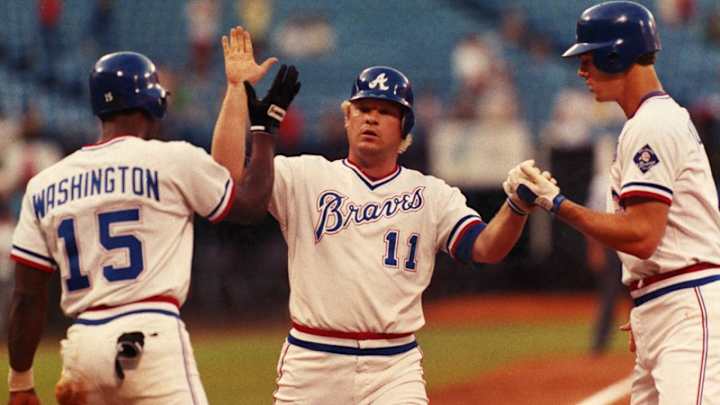Should the Braves have traded Bob Horner?

Bob Horner started his career with a bang. On June 16, 1978, Horner hit a home run in his first game with the Atlanta Braves. It was in the bottom of the sixth inning off Pirates starter Bert Blyleven.
He had been the first pick in the amateur draft just days earlier. A curly-headed blonde kid out of Arizona State, Horner showed immediately in the big leagues why he was the top player in the draft. He hit 23 home runs in 323 at bats and won the National League Rookie of the Year award.
Over the next few seasons, Horner would combine with Dale Murphy to form one of the best power-hitting duos in the National League.
Five years after Horner debuted, the Braves won the National League West. He was an All-Star at the age of 24. Manager Joe Torre had named him team captain, and the Braves seemed to go as Horner went.
But injuries became a big part of Horner’s resume. He broke his wrist trying to break up a double play on August 15, 1983 and would miss the rest of that season. Then, trying to recover from the injury, Horner played in only 32 games in 1984.
The Braves finished in second place in both seasons.
Horner would move to first base in 1985 and played his last two seasons in Atlanta there. Then, after refusing a low offer from the Braves, Horner took off for Japan. He made $2 million playing for the Yakult Swallows.
When he wanted to come back to the big leagues, the only deal he could get was from St. Louis for $950,000. Injuries again kept Horner from being the player he once was and the next spring he retired.
Horner was a Braves star for nine seasons, from 1978 through 1986. It’s ridiculous the Braves haven’t put him in their organizational Hall of Fame. He had 215 home runs and 994 hits with the Braves.
Looking back at that time, the Braves were always in need of pitching. They had Phil Niekro and that’s about it. There were constant rumors about the Braves breaking up the Horner/Murphy tandem and trading one of the two. Since Murphy was practically untouchable, Horner was the one most often mentioned in trade discussions.
In the early-1980s, one player often linked with a Horner trade was New York Yankees left-hander Ron Guidry. He had won the Cy Young Award in 1978 with a 25-3 record. After the Yankees lost Reggie Jackson to the Angels before the 1982, there was talk they wanted Horner to join Dave Winfield in the lineup.
Mario Soto was also a named attached to a Horner trade rumor. Soto was Cincinnati’s top pitcher in the early-1980s. In a five-year span from 1981-1985, Soto was 73-57 with a 3.16 ERA on some mediocre Reds teams.
The White Sox had three starting pitchers who were frequently mentioned in connection with Horner – Lamarr Hoyt, Richard Dotson and especially Britt Burns. The White Sox wanted a power bat to add to Ron Kittle and Carlton Fisk, and they had a revolving door at third base in the early-1980s.
Despite the rumors that would pop up every offseason, Horner was never traded, and the Braves never were able to trade for a top starting pitcher.
Part of the reason there were numerous Horner rumors was the trouble the Braves had at luring starting pitchers in free agency. They had tried to sign Don Sutton before the 1981 season and Floyd Bannister before the 1983 season to no avail. Pitchers didn’t want to play at Atlanta-Fulton County Stadium, which was known as a hitter’s park at the time.
Might the Braves have won more in the early-1980s if they had traded Horner? Well, one thing they could have done was to replace Horner at third base with Brook Jacoby, who was a top prospect for the Braves in 1983. Instead, the Braves traded Jacoby to the Indians in the horrific Len Barker trade at the end of the 1983 season.
Jacoby went on to play nine seasons in Cleveland and was a two-time All-Star. He had 120 home runs and 1178 hits with a .273 average and a .338 on base percentage. While he didn’t have Horner’s power, Jacoby finished with more hits and had a longer career than Horner did.
They wound up replacing Horner at third base with Ken Oberkfell, a light-hitting third baseman who had been part of the Cardinals’ World Series team in 1982. The Braves never really were the same when they didn’t have the second power hitting in the lineup with Murphy.
Gerald Perry took Horner’s place at first base in 1987, and he was hit a career-high 12 home runs that season. Brad Komminsk, another top prospect, had flopped and was sent to Milwaukee for Dion James, who became Atlanta’s leadoff hitter that same season.
The Braves never really had any power from 1987-1990. They signed Nick Esasky before the 1990 season to join Murphy, but he developed vertigo and played only nine games that season. It wasn’t until after Murphy was traded, when Ron Gant and David Justice emerged, that the team had a power-hitting duo again that rivaled Murphy and Horner.
But should the Braves have traded Horner when he was in his prime? Maybe they would have missed his injury-plagued seasons and instead had a top starter for their rotation, especially after Niekro left after the 1984 season. Would a Guidry or Soto or one of the White Sox starters had made a difference?
We’ll never know, but it’s an interesting question to think about in looking back at Braves history.
Listen to The Bill Shanks Show weekdays at 3:00 p.m. ET on Middle Georgia’s ESPN. You can listen online at TheSuperStations.com. Follow Bill on Twitter at @billshanks and you can email him at thebillshanksshow@yahoo.com.
